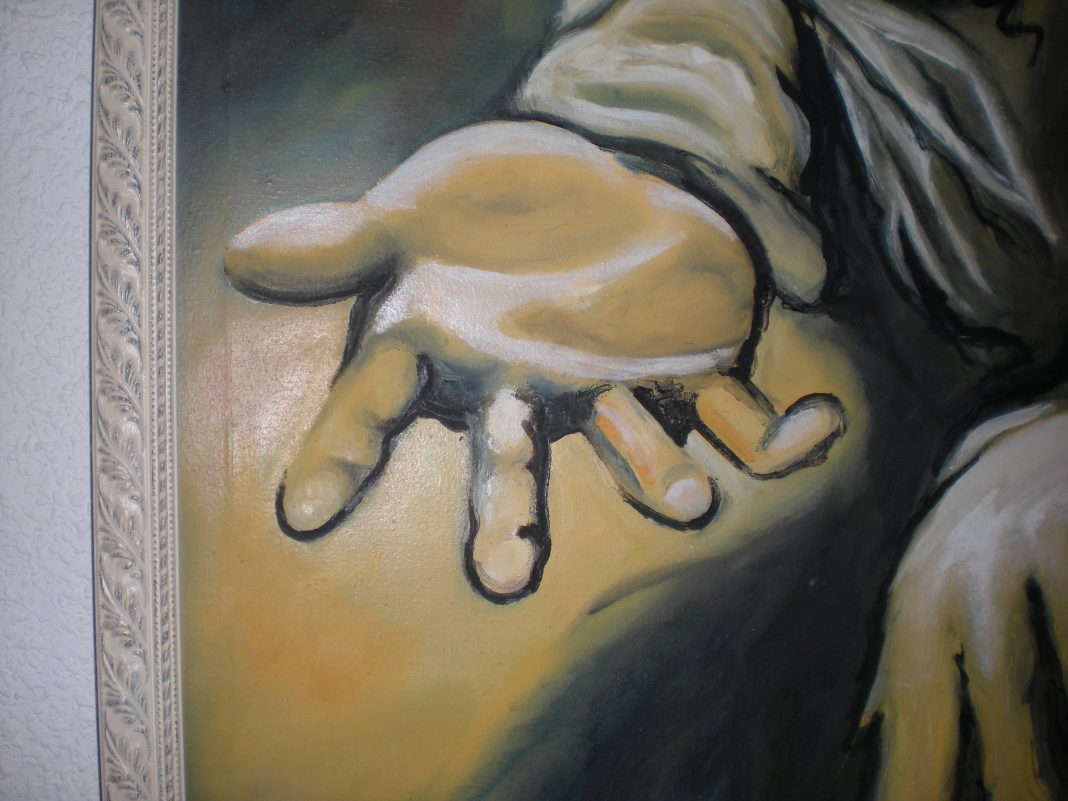UNITED STATES—Around 6:30 a.m. Madrid time I roused, well before my cellphone alarm went off, there were last good byes to Juan David, who was awake and Patricio, in his room across the hall. They would stay on another day, it was time for me to move on.
I walked down the steep marble steps of that townhouse for the last time. It smelled like the houses of Mexico and fresh cedar and shared something of their funereal formality. Dark woodwork was still the thing. I passed by the painting on the stairwell. I muttered a goodbye through the closed bedroom door where Dave and Miriam were staying. That painting had caught my attention our last day, and our host said, “My father would be very happy you like it.”
The painting of the man with the hat and the huge extended hand was part of a duo that his Argentinian father had bought when they stepped off a cruise ship in Havana. The other painting had left the house. It was a victory for Dave, his mom and siblings that one of the ridiculed paintings, that his father had a fondness for, had already left the house.
The symbolism was obvious, the extended palm.
I went outside in the fresh morning to Calle Cartegena. My driver was coming, Fernando would be back and meet me at one gate of the street of gated narrow tall townhouses.
British Airways flight 37 treated me well, upgrading myself and the Nebraska Salvadoran teacher to premium class. The red wine flowed and they brought us chicken Kiev and red velvet cake with linen napkins and real silverware. This was a further way to soften the moments of despair that accompany the prospect of going home.
I had easy conversation with the Nebraska schoolteacher, who was excited after a summer program in La Coruna, on the Atlantic coast. I shared with her my own dream of traveling to Nebraska. It is a place rare and exotic as Los Angeles. She looked back wistfully on Los Angeles, where she spent her first six months in the U.S. there. It is clear she has grown to like and understand the ways and people of Nebraska.
I am proud of the fact that I overcame many reasons not to make the trip to Madrid. There was a legal matter, there was an elderly relative teetering in a nursing home, and there were also financial considerations. I expected my practical sister to nix the trip, but she said, “You have to go, it’s your profession. You’ll never know the people you’ll meet.” Hey, there was still dental work that could have easily ground the airplane. I finally emailed Dr. Afshoon, “I have decided to forego the crown in lieu of travel.
It has been all too easy to capitulate to these circumstances in the past and let them stand in the way of an amazing journey. I’m so glad I decided to go.
An enormous surprise awaited me after Fernando left me at the airport. My first host in Madrid, Carmen, was already at the airport. Carmen, who would would use almost any excuse to visit Madrid from their rural residential community, came to bid me goodbye. It is nice to be met in a strange capital, but it is angelic to be greeted before boarding a plane home leaving behind a warm and beautiful time. Carmen and I stopped to have a café con leche in the airport. The sadness was there, but never got a chance to take root, even with the abyss flickering around the edges of my footsteps.
There still remain lessons of Carmen, this dynamo. “Nobody can ever make you feel bad,” “You have to live life,” and “If you really want to see old friends, you will see them. All the other people who say they never have time are hypocrites.”
I definitely lived by choosing the trip to Madrid. The good times, the endless conversation will live on as long as I live.
One final note: I avoided the luggage carrousel entirely at Dallas, our point of entry after the international flight. I went from the plane, with my nylon green case, now stuffed with many gifts, books and my clothes. One side of me were three policemen chatting to themselves. Then one looked at me and asked, “Where’s your luggage?”
I explained that the green case was my luggage. Other questions followed.
“Where are you coming from?”
“Madrid.”
“What are your carrying?”
“Clothes and shampoo.”
“Any food, pharaceuticals.”
“No.”
“Do you live in Madrid?”
“I’m going home to Hollywood.”
Just when I thought one of the police was going to rummage through by bag, the Dallas police waved me on. It seemed not inappropriate that I should be regarded as a suspicious figure living in Spain. It is true. And a part of me will live on in Madrid.
Grady Miller is the author of the thriller “The Hostages of Veracruz.”






